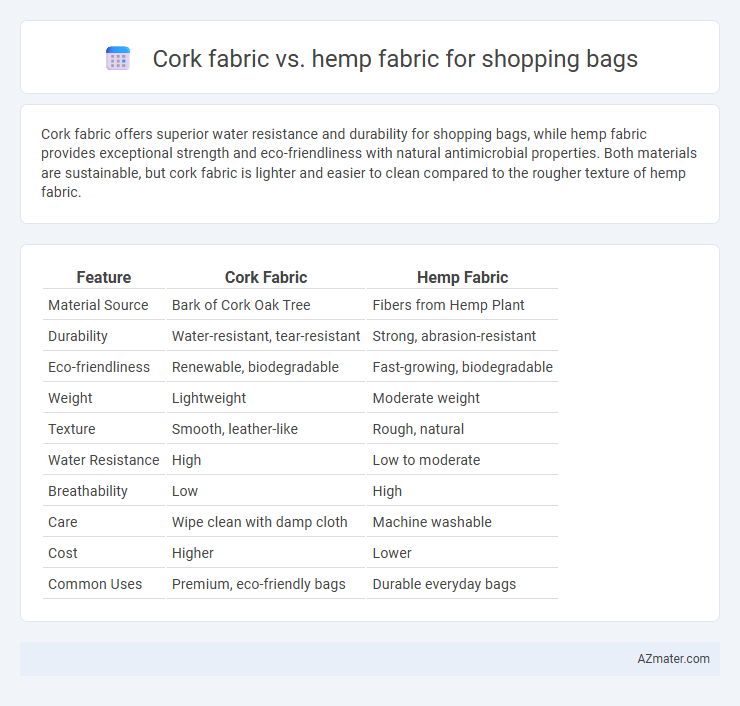Cork fabric offers superior water resistance and durability for shopping bags, while hemp fabric provides exceptional strength and eco-friendliness with natural antimicrobial properties. Both materials are sustainable, but cork fabric is lighter and easier to clean compared to the rougher texture of hemp fabric.
Table of Comparison
| Feature | Cork Fabric | Hemp Fabric |
|---|---|---|
| Material Source | Bark of Cork Oak Tree | Fibers from Hemp Plant |
| Durability | Water-resistant, tear-resistant | Strong, abrasion-resistant |
| Eco-friendliness | Renewable, biodegradable | Fast-growing, biodegradable |
| Weight | Lightweight | Moderate weight |
| Texture | Smooth, leather-like | Rough, natural |
| Water Resistance | High | Low to moderate |
| Breathability | Low | High |
| Care | Wipe clean with damp cloth | Machine washable |
| Cost | Higher | Lower |
| Common Uses | Premium, eco-friendly bags | Durable everyday bags |
Introduction to Eco-Friendly Shopping Bag Materials
Cork fabric and hemp fabric are innovative, sustainable materials ideal for eco-friendly shopping bags due to their renewable origins and minimal environmental impact. Cork fabric, harvested from the bark of cork oak trees without harming them, offers water resistance and durability, making it a practical choice for reusable bags. Hemp fabric, derived from fast-growing hemp plants, boasts high strength and biodegradability, providing an eco-conscious alternative that supports soil health and reduces plastic waste.
Overview of Cork Fabric: Origin and Production
Cork fabric, derived from the bark of the cork oak tree primarily found in Portugal and Spain, is a sustainable and eco-friendly material prized for its durability and water resistance. The harvesting process involves carefully stripping the bark without harming the tree, allowing it to regenerate every 9 to 12 years, making cork fabric a renewable resource. Its natural texture, lightweight nature, and hypoallergenic properties make cork fabric an excellent choice for shopping bags, offering both aesthetic appeal and functional performance.
Overview of Hemp Fabric: Origin and Production
Hemp fabric originates from the stalks of the Cannabis sativa plant, cultivated for thousands of years due to its durability and eco-friendly qualities. The production process involves harvesting, retting, decortication, and spinning, resulting in a strong, breathable, and biodegradable textile ideal for sustainable shopping bags. Hemp's low water requirements and resistance to pests make it a more environmentally responsible choice compared to conventional materials.
Environmental Impact: Cork vs Hemp
Hemp fabric offers superior environmental benefits due to its rapid growth, low water usage, and natural resistance to pests, reducing the need for harmful pesticides. Cork fabric, derived from the bark of cork oak trees, is renewable and biodegradable but involves a slower harvesting process that limits large-scale production. Both materials present eco-friendly alternatives to synthetic fabrics, with hemp providing a more sustainable option in terms of cultivation and overall resource consumption for shopping bags.
Durability and Strength Comparison
Cork fabric offers remarkable durability with its natural resistance to wear, water, and scratches, making it ideal for long-lasting shopping bags. Hemp fabric provides exceptional strength due to its dense fibers and durability, often outperforming cotton and other natural materials in load-bearing capacity. When comparing strength and durability, cork is more abrasion-resistant, while hemp excels in tensile strength and heavy-duty use.
Water Resistance and Maintenance
Cork fabric offers superior water resistance compared to hemp fabric, making it an excellent choice for shopping bags that need to withstand moisture and spills. Cork's natural waxy coating repels water effectively, requiring minimal maintenance and easy cleaning with a damp cloth. Hemp fabric, while durable and eco-friendly, is more absorbent and may require additional treatment or waterproofing sprays to maintain water resistance and prevent mold during regular use.
Style and Aesthetic Appeal
Cork fabric offers a sleek, smooth surface with a natural woodgrain texture, lending a modern and sophisticated look to shopping bags, perfect for eco-conscious fashion enthusiasts. Hemp fabric presents a rustic, earthy appeal with its coarse weave and natural variations, ideal for a bohemian or vintage style that emphasizes sustainability. Both materials provide unique aesthetic qualities, with cork delivering minimalist elegance and hemp showcasing organic, rugged charm.
Cost Analysis: Cork vs Hemp Bags
Cork fabric shopping bags generally cost more upfront due to the complex harvesting and processing of cork oak bark, while hemp bags tend to be more affordable because hemp grows rapidly and requires less intensive processing. Hemp bags also offer long-term savings through durability and biodegradability, although cork bags provide unique water resistance and lightweight benefits that may justify the higher price for some consumers. When comparing costs, consider the balance between initial investment and functional advantages specific to cork and hemp materials.
Consumer Preferences and Market Trends
Cork fabric offers a lightweight, water-resistant, and eco-friendly alternative favored by consumers seeking durability and unique texture in shopping bags. Hemp fabric appeals to environmentally conscious buyers due to its natural anti-bacterial properties, biodegradability, and strength, making it a popular choice in sustainable fashion markets. Market trends indicate increasing demand for both materials as zero-waste and cruelty-free lifestyles drive growth in ethical consumerism.
Conclusion: Choosing the Right Fabric for Your Shopping Bag
Cork fabric offers exceptional water resistance, durability, and a lightweight feel, making it ideal for long-lasting, eco-friendly shopping bags. Hemp fabric provides superior strength, breathability, and natural antibacterial properties, ensuring a sustainable and sturdy option for daily use. Selecting between cork and hemp depends on your preference for water resistance and texture versus biodegradability and ruggedness in a shopping bag.

Infographic: Cork fabric vs Hemp fabric for Shopping bag
 azmater.com
azmater.com